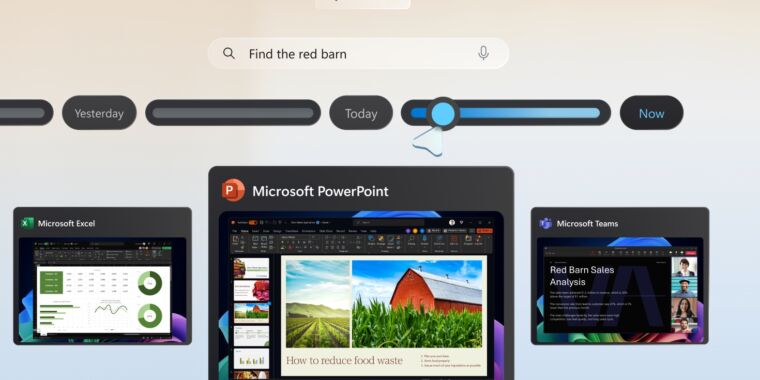Microsoft will begin sending a revised version of its controversial Recall feature to Windows Insider PCs beginning in October, according to an update published today to the company’s original blog post about the Recall controversy. The company didn’t elaborate further on specific changes it’s making to Recall beyond what it already announced in June.
For those unfamiliar, Recall is a Windows service that runs in the background on compatible PCs, continuously taking screenshots of user activity, scanning those screenshots with optical character recognition (OCR), and saving the OCR text and the screenshots to a giant searchable database on your PC. The goal, according to Microsoft, is to help users retrace their steps and dig up information about things they had used their PCs to find or do in the past.
The problem was that other users on the same PC, or attackers with physical or remote access to your PC, could easily access, view, and export those screenshots and the OCR database since none of the information was encrypted at rest or protected in any substantive way.
Among the changes Microsoft has said it will make: The database will be encrypted at rest and will require authentication (and periodic reauthentication) with Windows Hello before users will be allowed to access it. The feature will also be off by default, whereas the original plan was to turn it on by default and make users go into Settings to turn it off.



The solution: https://www.debian.org/
Mint is always an option too.
Mint is my go to suggestion for new people switching over.
Absolutely. I don’t use it myself, but it’s where I started and it’s what I suggest.
or better, MX 23 :)
Googling this brings up a motorcycle driving school.
MX Linux is a great distro
Haven’t tried it myself, but it looks interesting. I figure that GNOME and KDE are probably more comfortable than XFCE for general users and gamers, respectively.
I don’t game so I’m using Xfce only, I love it
I game and I am using XFCE only, GNOME feels really bad for me and KDE I don’t want to tinker with.
KDE has some advantages when it comes to VRR and HDR, but those features will probably make their way to Gnome and XFCE eventually too.
Or, please consider Devuan as well, to ensure there are distros without hard dependencies on systemd, an expansive attempt to cement IBM/RedHat’s control over the direction of Linux through foundational changes to the init, filesystem, login, homedir, and other components…
Please don’t bother replying to change my mind… never gonna like systemd no matter what. If it works for you, fine. Some of us still find it wholly unnecessary.
I specifically pointed out Debian instead of Fedora because of my discomfort with what happened to CentOS, even though Fedora comes with more out-of-the-box for desktop-users/gamers.
Linux has already switched to systemd, whether you like it or not. 99.9% of new users will only ever learn systemd, if they even learn what an init system is at all.
Debian switched to systemd in 2013, and IBM was not involved with systemd before 2019. Poettering works for Microsoft, not IBM.
The changes to init were necessary. The init scripts were legacy bloat, even in 2013. Furthermore, the work from the systemd project on creating separate daemons for other parts of the OS have brought a lot of new features and innovation to Linux.
Also, lots of nasty bugs are in systems, because of bloat. They are getting fixed slowly, but who doesn’t know cases where you cannot shut down the machine, because of “bouncing stars”.
I still need to look up how to write an own startup script or start two same daemons listening on different IPs. This is why I avoid systemd on servers and only leave it on workstations.